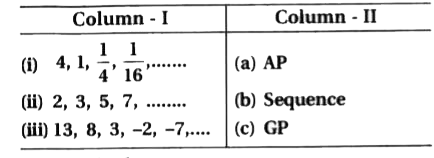The sum of terms equidistant from the beginning and end in an AP is equal to……..Solution in Gujrati
The correct Answer is:a1+an
Step by step video, text & image solution for The sum of terms equidistant from the beginning and end in an AP is equal to…….. by Maths experts to help you in doubts & scoring excellent marks in Class 11 exams.
Updated on:21/07/2023Topper's Solved these Questions
- SEQUENCE AND SERIESBOOK - KUMAR PRAKASHANCHAPTER - SEQUENCE AND SERIESEXERCISE - Solutions of NCERT Exemplar Problems - True/False
5 Videos
- SEQUENCE AND SERIESBOOK - KUMAR PRAKASHANCHAPTER - SEQUENCE AND SERIESEXERCISE - Solutions of NCERT Exemplar Problems -Matching The Columns
2 Videos
- SEQUENCE AND SERIESBOOK - KUMAR PRAKASHANCHAPTER - SEQUENCE AND SERIESEXERCISE - Solutions of NCERT Exemplar Problems -Objective Type Questions
10 Videos
- RELATIONS AND FUNCTIONSBOOK - KUMAR PRAKASHANCHAPTER - RELATIONS AND FUNCTIONSEXERCISE - Solutions of NCERT Exemplar Problems (Question of Module)
16 Videos
- SETSBOOK - KUMAR PRAKASHANCHAPTER - SETSEXERCISE - QUESTION OF MODULE
28 Videos
Similar Questions
Two sequences cannot be in both AP and GP together.
View SolutionMatch the following

View SolutionIf the sum of n terms of an AP is given by Sn=3n+2n2, then the common difference of the AP is
View SolutionA={−1,0},B={−1,0,1}, then find A×BandB×A
View SolutionA{x∈R∣x2+3=0} is a set of………type.
View SolutionIn a finite G.P. the product of the terms equidistant from the beginning and the end is always same and equal to the product of first and last term.
View SolutionShow that in an A.P. the sum of the terms equidistant from the beginning and end is always same and equal to the sum of first and last terms.
View SolutionIn the expansion of (1+x)^(n) the coefficients of terms equidistant from the beginning and the end are equal.
View SolutionIn a finite GP the product of the terms equidistant from the beginning and end is always same and is equal to the product of first and last term.
View SolutionAny term of an AP (except first ) is equal to half the sum of terms which are equidistant from it .
View SolutionIf the sum to 2n terms of an Ap 2,5,8,11 , …. is equal to the sum to n terms of an AP 57,59,61,63, …. , then n is equal to
View Solutionकिसी A.P. में आरंभ और अन्त से समदूरस्थ पदों का योग सदैव समान रहता हैं और यह प्रथम और अंतिम पदों के योग के बराबर होता हैं ।
View SolutionProve that in an A.P. of finite number of terms the sum of any two terms equidistant from the beginning and the end is equal to the sum of the first and last terms.
View SolutionProve that in a G.P. of finite number of terms the product of any terms equidistant from the beginning and the end is constant and is equal to the product of the first and last terms.
View SolutionIf n be a positive integer , then the terms in the expansion of (1+x)n , having equal numerical coefficients shall be equidistant from the beginning and the end . - Prove this.
View Solution
